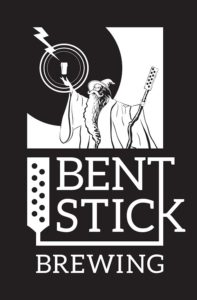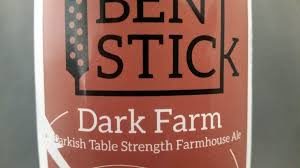 Following their launch a couple months ago, Edmonton’s new tiny brewery, Bent Stick, has followed up their initial releases with a “farmhouse series”, a collection of three interpretations of the earthy, spicy style.
Following their launch a couple months ago, Edmonton’s new tiny brewery, Bent Stick, has followed up their initial releases with a “farmhouse series”, a collection of three interpretations of the earthy, spicy style.
I must say going with a farmhouse collection so soon after opening is a clear signal that Bent Stick has no plans on doing things the usual way (as if we didn’t know that already). Farmhouse ales pose a few challenges. First, they are a niche but emerging style that are not built for common palates. Odd earthiness and spiciness accentuates a (usually) fairly dry beer. Saisons – just one kind of farmhouse ale – are becoming a “thing”, but many of the more obscure takes on this historical style continue to lurk in the more geeky corners of the beer world. Second, farmhouse ales are notoriously difficult to brew; the yeast strains are fickle and high maintenance and it is easy to get the balance wrong. So, embarking on a full-out, three-beer series right off the get-go is being rather bold, in my opinion.
It was an interesting enough experiment to draw my attention, so I picked up a bottle of each and over the course of a couple of days sampled each one.While I didn’t do a side-by-side comparison (for moderation reasons) I did try to keep good notes and remain mindful of how they compared with one another.
First up was Farm Stock, what they are calling a “sessionable farmhouse ale” at 4.5%. It is light gold with a slight haze. It forms a huge, oversized tight white head. Too much actually, which I am not sure if that is the beer or my pour. The aroma offers light grass, peach, and hints of lemon. I find it fairly subdued overall and noted it relative lack of earthiness.
In the sip I first find light graininess, a delicate stone fruit and hints of berry. Playing in the background is some musty earthiness. Only subtle touches of funkiness – this beer is more about summery fruitiness. It has a dry finish with a honey and earth accent. Overall very light and summery. I find it refreshing,but its saison-esque character is subdued, at best. A good entry point for someone new to farmhouse ales.
Next up was Dark Farm, in their terms a “Darkish Table Strength Farmhouse”. This one is 5%, so they are keeping them moderate on the alcohol scale. It pours dark, porter-like brown, reminding of cola. It is almost opaque. It has a big, bubbly tan head that does not get overdone. The aroma gives off milk chocolate, a cola sweetness, dark fruit, some caramel, toffee and touches of burnt almond. I quite like the aroma, although, like the first, not as farmhouse as I might expect.
The flavour is nutty chocolate upfront, adding in some raisin, caramel and toffee as backing and sweetener. A vague earthiness pervades, as does a slight yeasty bite that reminds me of too-young homebrew. The finish is moderately dry, with a subtle yeast sharpness and some funky yeast notes.
I love the malt bill in this beer as it really brings out a pleasant complexity. The yeast character is a bit perplexing to me – a bit too sharp and I am looking for a bit more musty, earthy notes. I can’t be sure what happened but maybe the particular strain they used is not ideal for darker malts.
Finally there is Hearty Farm Stock, a “Big and Bold Farmhouse” at 7%. It is dark yellow, again offering a bit of haze and grows a tight bright white head. It forms a significant layer along with some Belgian lacings. The aroma starts with light pilsner malt, honey, a light earthy spiciness as an accent. I also pick up touches of stone fruit, as well as a slightly funky edge in background. This seems the most farmhouse of the three in terms of aroma.
In the sipping I find the front has a honey-like grainy sweetness and some fruitiness. But then the yeast comes in with an assertive earthiness backed by a noted peppery spiciness. The finish is fairly dry and spicy. I like the linger of dirty hay and black pepper.
This one is a full-on farmhouse. It is fairly aggressive for a saison, but fits in the new BJCP guidelines somewhere between a standard and a super saison. Bold flavours backed by a grainy and dry malt are what makes this beer stand out. I found myself wishing I had bought two bottles of this one.
So what to make of Bent Stick’s Farmhouse experiment? First, and maybe most important, it does an excellent job highlighting the range of flavours, colours and balance in this esoteric style. With the popularity of standard saison, it is easy to forget farmhouse is actually a style meant to be broad and diverse. From small beer, to dark beer to big and bold – all are deserving of the farmhouse name.
Second, Bent Stick shows its emerging brewing chops in this series. Hard to brew, in particular when aiming to try three different takes at the same time. The three beer aren’t perfect (what beer is?), but they do an excellent job of bringing out different aspects of the style. I think people will find it an enjoyable educational experience to try these beer alongside one another.
Seems like the four city-dwelling Bent Stick boys know a thing or two about life on the farm. At least brewing on the farm, anyway.


Leave a Reply